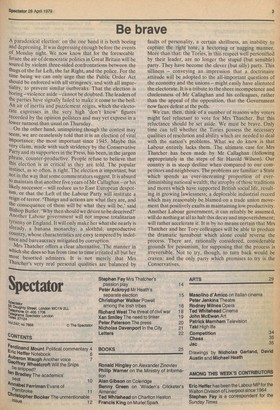Be brave
A paradoxical election: on the one hand it is both boring and depressing. It was depressing enough before the events of Monday night. We now know that for the foreseeable future the air of democratic politics in Great Britain will be soured by violent three-sided confrontations between the thugs of the far Left, the far Right, and the police. For the time being we can only urge that the Public Order Act Should be enforced with all stringency, and with all impartiality, to prevent similar outbreaks. That the election is boring — violence aside —cannot be doubted. The leaders of the parties have signally failed to make it come to the boil. An air of inertia and puzzlement reigns, which the electorate expresses in the very high 'don't know' figures recorded by the opinion pollsters and may yet express in a lower turnout than usual on Thursday.
On the other hand, uninspiring though the contest may seem, we are ceaselessly told that it is an election of vital importance, the most important since 1945. Maybe this very claim, made with such stridency by the Conservative Party and its supporters in the Press, has been, in the jargon Phrase, counter-productive. People refuse to believe that this election is as critical as they are told. The popular instinct, as so often, is right. The election is important, but not in the way that some commentators suggest. It is absurd to maintain that another five years of Mr Callaghan — or his likely successor — will reduce us to East European despotism, or that the Left of the Labour Party will institute a reign of terror. 'Things and actions are what they are, and the consequence of them will be what they will be,' said Bishop Butler. 'Why then should we desire to be deceived?' Another Labour government will not impose totalitarian tyranny on England. It will only make her what she nearly is already, a banana monarchy: a slothful, unproductive country, whose characteristics are envy tempered by indolence and bureaucracy mitigated by corruption. Mrs Thatcher offers a clear alternative. The manner in Which she does so has from time to time irritated all but her most besotted admirers. It is not merely that Mrs Thatcher's very real personal qualities are balanced by faults of personality, a certain shrillness, an inability to capture the right tone, a hectoring or nagging manner. More than that: the Tories, in this respect well personified by their leader, are no longer the stupid (but sensible) party. They have become the clever (but silly) party. This silliness — conveying an .impression that a doctrinaire attitude will be adopted to the all-important questions of the economy and the unions — might easily have alienated the electorate. It is a tribute to the sheer incompetence and cluelessness of Mr Callaghan and his colleagues, rather than the appeal of the opposition, that the Government now faces defeat at the polls.
We can, then, think of a number of reasons why voters might feel reluctant to vote for Mrs Thatcher. But this reluctance should be set aside. We must be brave. Only time can tell whether the Tories possess the necessary qualities of resolution and ability which are needed to deal with the nation's problems. What we do know is that Labour entirely lacks them. The ultimate case for Mrs Thatcher has been made by Mr Callaghan (following appropriately in the steps of Sir Harold Wilson). Our country is in steep decline when compared to our competitors and neighbours. The problems are familiar: a State which spends an ever-increasing proportion of everdiminishing national wealth; the atrophy of those traditions and mores which have supported British social life, resulting in growing lawlessness; a deplorable industrial record which may reasonably be blamed on a trade union movement that positively exults in maintaining low productivity. Another Labour government, it can reliably be assumed, will do nothing at all to halt this decay and impoverishment; will rather accelerate it. It is by no means certain that Mrs Thatcher and her Tory colleagues will be able to produce the dramatic turnabout which alone could reverse the process. There are, rationally considered, considerable grounds for pessimism, for supposing that the process is irreversible. Not to try, though, to turn back would be craven: and the only party which promises to try is the Conservatives.






































 Previous page
Previous page